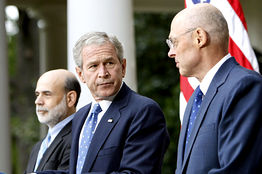As of today John McCain is trailing Barack Obama in almost every measured poll, and his electoral count looks grim. What’s more, Obama is raising considerably more money as McCain, which gives you a pretty good idea where the bets are from a corporate standpoint. And so the smear campaign has begun in earnest.
Last week Governor Palin accused Senator Obama of consorting with domestic terrorists, a charge based on a New York Times article that reported that Obama had known a member of the Weathermen. The problem with this is that the article also went on to state that their ties were very limited to several business meetings and an occasional chance interaction in the neighborhood in which they both lived. Other media have similarly debunked this charge.
Now the Republicans are claiming that Obama is taking money from overseas, only that have not produced a single shred of evidence to support their request for an investigation by the Federal Election Commission. Here’s the problem for the Republicans with both of these charges: they’re baseless. When people repeatedly make baseless charges, we are reminded of the boy who cried wolf. Just how many times can one get away with it without hurting his reputation?
In Governor Palin’s case, since she has very little going for her already, it’s a short trip to the bottom, from which she will not return. She did herself a disservice by accepting this nomination and being McCain’s bulldog. Had she not done so she could have probably slipped right into a U.S. Senate seat. Now she’ll have a difficult time running for dog catcher.
For nameless GOP operatives filing lawsuits, it won’t be so bad for them as it will their entire party. The mud must stick somewhere, and if it won’t stick to the target, and it won’t stick to a nameless flinger, it will stick to who they represent.
Republicans should be pretty frustrated with such tactics because as 1992 demonstrated it is perhaps better to lose one election and attempt to hold the moral highground, and then come back two years later and try again. For John McCain it’s just sad. I view the man as a hero from Vietnam, one who stood as a sometimes lone voice for veterans of that mess, and who has now authorized behavior that should be beneath him.

 I am sure I’m not that different from many others when I ask the simple question, what happened? How did the banks get into such a mess? What didn’t they see, and what regulation failed? Was the reserve ratio that the federal reserve demands too low? Did debt move from regulated to unregulated, and if so, why would that have caused a failure of regulated banks? How is it that the vast amount of debt went unrecorded until recently? And what are we doing wrong now?
I am sure I’m not that different from many others when I ask the simple question, what happened? How did the banks get into such a mess? What didn’t they see, and what regulation failed? Was the reserve ratio that the federal reserve demands too low? Did debt move from regulated to unregulated, and if so, why would that have caused a failure of regulated banks? How is it that the vast amount of debt went unrecorded until recently? And what are we doing wrong now?